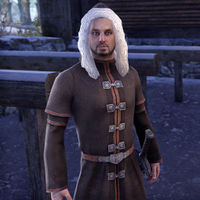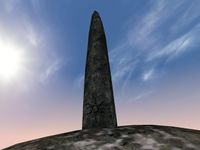
The All-Maker, also known as the All-Father,[1] is a mysterious deity revered as the wellspring of creation. The All-Maker could be a deity from the Atmorans or branched from the animal deities of the Atmorans. Either way they share similarities with each other and derive from the ancient Nords, reverence for the All-Maker is now nearly extinct. However, the isolated Skaal of Solstheim preserved the ancient beliefs throughout the ages, and modern scholars have learned of the All-Maker through their eyes.[2] At least some of the Skaal were known to spread the faith of All-Maker outside of Solstheim, attempting to convert their mainland kin.[3]
All life flows from the All-Maker like a great river, and, in time, this river flows back to its source.[4] It is believed that the All-Maker dwells in the world of the spirit.[5] The spirits of dead creatures return to the All-Maker, who shapes new life and returns it to Mundus. Death, then, is simply the beginning of the next stage of this endless journey.[2] However, each life is a gift given in the great wisdom of the All-Maker, thus each one is very precious and sacred. Even the snow is viewed as a blessing for the shelter it can offer and for allowing hunters to track prey.[6] The All-Maker favors those who hone their skills, and disfavors the greedy and lazy.[7][1] The six All-Maker Stones of Solstheim are viewed as representations of the six aspects of nature, the six great gifts of the All-Maker—flora, fauna, the sun, the earth, water, and wind. The stones are believed to be conduits by which the All-Maker's power flows into the world.[4][8][9]
"Oneness" with the land is considered crucial to pleasing the All-Maker.[2][8] The Skaal practice this concept by seeking harmony with their surroundings. For example, firewood is collected from dead trees. Hunting is for subsistence, not sport. The sanctity of life demands that violence only be used as a last resort.[2] The Skaal draw power from the natural order (the harmony, or balance, of the land); when they are in harmony with the land, they are joined with it through the grace of the All-Maker, and when this harmony is upset, so is the All-Maker, and their power dwindles.[8][1][10]
It's believed the All-Maker cursed ancient warriors with undeath for committing acts of cannibalism, thus creating the draugr. Another legend says that when the All-Maker breathed life into the creatures of the land, that "Breath" blew through the trees as well. Some of these trees kept a part of this life, creating the spriggans.[6] In times of great need, the Skaal perform a ritualistic hunt of blessing and cleansing that they call the Ristaag in order to demonstrate their gratitude to, and hopefully please, the All-Maker. They also practice the Ritual of the Gifts, a pilgrimage to perform certain rituals at each of the All-Maker Stones to restore Oneness with the land.[8] Skaal often accredit the All-Maker with greater wisdom and power than deities which are part of polytheistic traditions.[11]
In opposition to the All-Maker is the Adversary, an equally enigmatic opposing force which works to corrupt the dominion of the All-Maker.[6][1] The often-malevolent Daedra are treated much the same in the Skaal tradition as they are in Aedra-worshipping cultures,[4][7][12] though they are presumably considered to be merely some of the many evil aspects of the Adversary.[1]
The All-Maker's mystique often leads to speculation on the connections the deity may bear with other known deities, such as Alduin. However, Thartaag, an aspect of the Adversary, bears clear connections to Alduin, serving as a World-Devourer who will consume the world at the 'End of Seasons'.[13] In the context of The Story of Aevar Stone-Singer, the All-Maker and the Adversary bear some resemblance to Anu and Padomay, who are in a similar antithetical conflict.[14] Certain texts state that Sithis is considered to be the All-Maker.[UOL 1][15]
NotesEdit
See AlsoEdit
- Children of the All-Maker by Tharstan of Solitude — An outsider's accounting of the Skaal
- The Story of Aevar Stone-Singer — Traditional Skaal myth about a young Skaal's journey to recover the Gifts of the All-Maker
ReferencesEdit
- ^ a b c d e The Story of Aevar Stone-Singer
- ^ a b c d Children of the All-Maker — Tharstan of Solitude
- ^ Gellhidil's dialogue in ESO
- ^ a b c Storn Crag-Strider's dialogue in Skyrim: Dragonborn
- ^ Tharsten Heart-Fang's dialogue in Morrowind: Bloodmoon
- ^ a b c Dialogue of Skaal villagers in Morrowind: Bloodmoon
- ^ a b Wulf Wild-Blood's dialogue in Skyrim: Dragonborn
- ^ a b c d Korst Wind-Eye's dialogue in Morrowind: Bloodmoon
- ^ Frea's dialogue Dragonborn
- ^ Yrsa's dialogue in Skyrim: Dragonborn
- ^ Nikulas' dialogue in Skyrim: Dragonborn
- ^ The Monomyth
- ^ The Guardian and the Traitor — Lucius Gallus
- ^ The Annotated Anuad
- ^ Sithis
- ^ All-Maker's Senche-raht in ESO
Note: The following references are considered to be unofficial sources. They are included to round off this article and may not be authoritative or conclusive.
